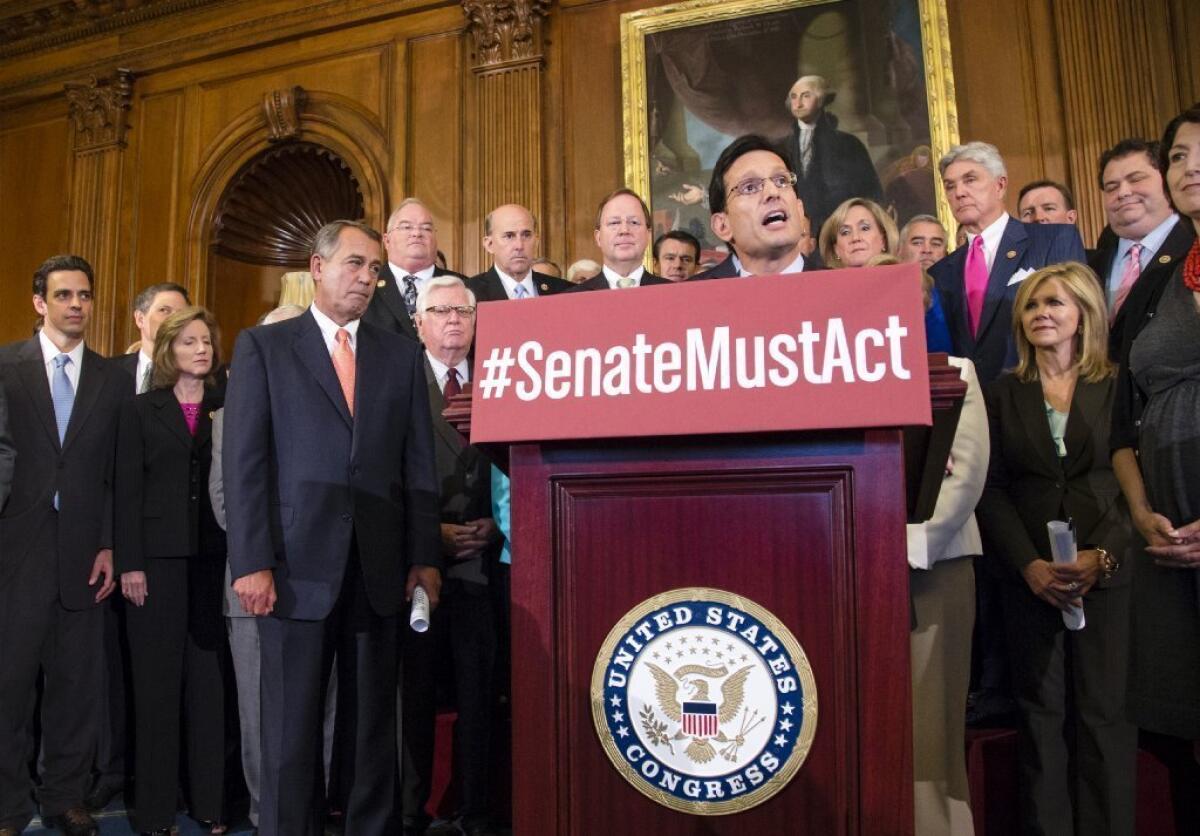In Washington, countdown to a shutdown

“The American people don’t want the government shut down, and they don’t want Obamacare. The House has listened to the American people.”
That’s what Speaker John A. Boehner (R-Ohio) said at the GOP’s victory rally Friday after the House voted to pass a spending bill that cut all funding for the president’s healthcare law — and took the country one step closer to a government shutdown on Oct. 1.
The American people, alas, weren’t in the room to speak for themselves. But was Boehner right about their desires? Polls show that most Americans are, not surprisingly, divided.
Yes, a majority doesn’t like Obamacare. They’re unsure about what it will do and worried that it might make their healthcare worse. But do they really want to defund the law, and risk the chaos of a government shutdown to do it? Probably not, most polls suggest.
As one Republican pollster told me, though a majority of voters don’t like Obamacare, they’re not angry enough about it to risk a fiscal crisis that could hurt the economy.
So why are Republican lawmakers hearing a different message? Because most of them represent districts so conservative that they are listening only to their own choir. “It’s clear where the public in my district is,” said Rep. Jim Bridenstine (R-Okla.), a tea party firebrand. “They want Obamacare repealed. They want it defunded. They want it dismantled.”
Bridenstine, a Navy Reserve pilot from Tulsa, is probably right. In his solidly Republican district, Mitt Romney won two-thirds of the vote in the last presidential election.
A visit to the House side of Capitol Hill these days feels a bit like an excursion to an alternate universe, where the voters are all conservative, the will of the American people is crystal clear and the only mystery is how that Obama fellow ever got reelected.
“This is all a result of redistricting,” a Republican strategist told me. “The only election these guys have to worry about is the Republican primary. The only danger they face is from the right.”
According to ratings compiled by Larry Sabato of the University of Virginia, only 28 of the House’s 233 Republicans have even a theoretical chance of losing their seats to a Democrat next year; the other 205 are safe as long as they win their primaries. (The same is true of most House Democrats, of course.)
Outside the conservative bubble of the House GOP conference, the politics of the budget standoff look different. Karl Rove, former political advisor to George W. Bush, has warned that the only winner in a government shutdown would be Obama. “This is one thing that can rescue him,” Rove said on Fox News.
In the Senate, Republicans acknowledge there is almost no chance of passing legislation to defund Obamacare, the president’s most cherished achievement. Even Sen. Ted Cruz (R-Texas), the loudest champion of the defund Obamacare movement, agreed on that last week, landing him in hot water with the House conservatives he was urging to plunge ahead.
The entire strategy, warned Sen. Bob Corker (R-Tenn.), is “a box canyon” for Republicans — a trap with no way out but retreat.
Cruz and other tea party senators have vowed to filibuster to block the Senate from approving a spending bill that doesn’t defund Obamacare, but Senate rules make that difficult. So the Senate is expected to strip the Obamacare provision and kick the bill back to the House, where Boehner and his Republicans will consider their next move.
They might make a dignified retreat and pass the Senate version before the Sept. 30 deadline. Or, more likely, they might engage in another round of legislative pingpong, in which doomed proposals bounce between the two branches of Congress as the clock runs out. One veteran budget guru, Stan Collender of Qorvis Communications, puts the chances of a government shutdown at 70%.
And that’s not even the worst possible outcome. Boehner and his lieutenants have told House members that the current battle over the spending bill is only a preliminary bout. The real fight, they’ve said, will be over the debt ceiling — the government’s authority to borrow money to pay its bills, which is expected to run out in October or November,
Once again, conservatives have begun telling one another that the American people would welcome the crisis if it resulted in less federal spending and the end of Obamacare. They argue that a debt-ceiling standoff wouldn’t force the federal government to default on its debts and throw the world economy into crisis; the Treasury, they say, could keep paying bondholders and stop most of its other checks. Even if that were possible (and the Treasury Department says it isn’t), the world’s lenders would almost certainly downgrade Uncle Sam’s credit rating, imposing higher interest costs on the federal budget for years to come.
This may sound like just another round of Washington’s recurring impasse, but this time the prospects for a quick solution look worse. The Republicans have chosen to demand the one concession Obama is least likely to make: the crippling of Obamacare. And the GOP’s chief deal maker, Sen. Mitch McConnell (R-Ky.), is battling a primary challenge on his right, which means he’s not eager to play the role of middleman this year.
When Boehner described what the American people want from Congress, he left one thing out: They also want their government to solve problems, even if that sometimes requires an uncomfortable dose of compromise. They aren’t seeing much of that from the House of Representatives this year.
[email protected] Twitter: @DoyleMcmanus
More to Read
A cure for the common opinion
Get thought-provoking perspectives with our weekly newsletter.
You may occasionally receive promotional content from the Los Angeles Times.











